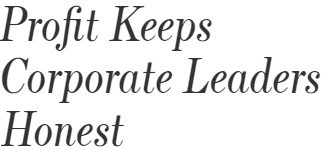My warm and fuzzy feelings for “capitalism” turn sour when someone promotes a modified version such as “common-good capitalism.”
Why? Because I worry such terms imply a Trojan Horse for statism. And that’s definitely the case with so-called “stakeholder capitalism.”
As you can see, my core argument is that stakeholder capitalism is just another way of saying cronyism. And if I was being lazy, I would simply point out that Elizabeth Warren is a big proponent of the idea. That, by itself, should convince every thinking person that it’s a bad idea.
But I’m not going to be lazy. I’m going to cite some experts to show why stakeholder capitalism is bad news.
But first, I mentioned Milton Friedman’s famous quote in the above video clip.
Here’s the full quote, and notice that he explicitly says companies should follow rules – both legal and ethical – as they pursue profits.
Friedman was advocating what is sometimes referred to as “shareholder capitalism,” which is the notion that a company should strive to earn honest profits for its owners.
So what, then is stakeholder capitalism? In a column for the Wall Street Journal, Professor Alexander William Salter warns us that it is an invitation for intervention.
…beneath the lofty rhetoric, stakeholder capitalism is mostly a front for irresponsible corporatism. …Stakeholder capitalism is used as a way to obfuscate what counts as success in business. By focusing less on profits and more on vague social values, “enlightened” executives will find it easier to avoid accountability even as they squander business resources.
While trying to make business about “social justice” is always concerning, the contemporary conjunction of stakeholder theory and woke capitalism makes for an especially dangerous and accountability-thwarting combination. …profits are an elegant and parsimonious way of promoting efficiency within a business as well as society at large. Stakeholder capitalism ruptures this process. When other goals compete with the mandate to maximize returns, the feedback loop created by profits gets weaker.
Writing for the Washington Post, George Will has a similarly scathing assessment.
…everyone who values economic dynamism, and the freedom that enables this, should recoil from the toxic noun “stakeholder.” …Stakeholder capitalism violates fiduciary laws that require those entrusted with investors’ money to employ it “solely in the interest of” and “for the exclusive purpose of providing benefits to” the investors. …
In a dynamic society, resources are efficiently disposed by corporate managements whose primary duty, which other corporate activities do not compromise, is to maximize shareholder value… Self-proclaimed stakeholders, parasitic off others’ labor and accumulation, assert that everything is their business.
In a column for the Wall Street Journal, Phil Gramm and Mike Solon point out that today’s stakeholder capitalism is very similar to feudalism, which was a pre-industrial form of socialism.
…because of the misery Marxism has imposed, the world has a living memory and therefore some natural immunity to a system in which government takes the commanding heights of the economy. No such immunity exists to the older and therefore more dangerous socialism of the pre-Enlightenment world.
In the communal world of the Dark Ages, the worker owed fealty to crown, church, guild and village. Those “stakeholders” extracted a share of the product of the sweat of the worker’s brow and the fruits of his thrift. …The 18th-century Enlightenment liberated…people to…own the fruits of their own labor and thrift. …
These Enlightenment ideas spawned the Industrial Revolution and gave birth to the modern world… Remarkably, amid the recorded successes of capitalism and failures of socialism rooted in Marxism, pre-enlightenment socialism is re-emerging in the name of stakeholder capitalism. …the biggest losers in stakeholder capitalism are workers, whose wages will be cannibalized.
Amen. The only economic system to ever produce mass prosperity for workers is capitalism (or, if you prefer, free enterprise or classical liberalism).
And the pursuit of profit is what generates efficiency, which is economic jargon for higher living standards. And that’s good for rich people and poor people.
The bottom line is that I’m not surprised when politicians support so-called stakeholder capitalism. After all, the crowd in Washington likes to have more power.
Based on what I said at the end of the above video, I’m disappointed – but not surprised – when big businesses (such as the Business Roundtable or Larry Fink of Blackrock) embrace the idea. After all, “creative destruction” is not so appealing when you’re already as the top.
P.S. I was very amused by the left-leaning CEO who criticized Friedman, but then did exactly as Friedman recommended.



No comments:
Post a Comment